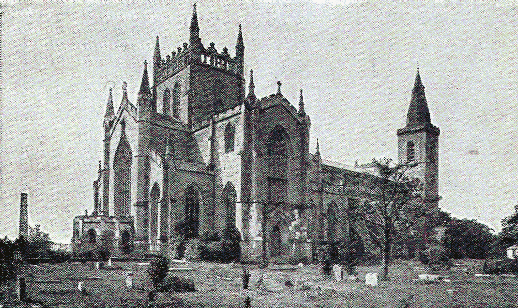Cambridge Historical Reader: Primary - Cambridge Press |
Robert Bruce and the Black Douglas
The cruel death of Sir William Wallace only made the Scots the more ready to fight for the freedom of their country. A few months later they crowned Robert Bruce, at Scone, the old crowning place of the Scottish kings.
Bruce belonged to the royal family of Scotland, and was, in every way, a great king. He was strong and brave, kind-hearted and true; and, although he had many hardships to undergo, he never lost heart.
By his royal master's side, in storm and sunshine, was "the Good lord Douglas"—or "the Black Douglas" as he was often called. No deed was too daring for him to attempt, and many are the stories related of him.
 THE BRUCE STATUE, LOOKING TOWARDS THE WALLACE MONUMENT, STIRLING |
It was a good thing for king Bruce that Edward I did not live long enough to meet him in battle. Edward's young son, Edward II, was too fond of pleasure to carry on the war; and, in a few years, Bruce and his brave followers had won back all their. towns, except Stirling.
Then the young English king roused himself from his life of ease, and led a splendid army into Scotland, only to be beaten in the great battle of Bannockburn. This, perhaps, was the greatest fight which ever took place on Scottish soil, and it is the one of which the Scots are most proud.
"Good king Robert" only lived a few years after his country became free, and, on his death bed, he sent for his old friend, Sir James Douglas, and many of his great lords.
He made them swear to be true to their country and to his little son, David, who would soon be their king. Then he called Douglas to his side, and said, "Sir James, my dear friend, it has long been my wish to go and fight the enemies of the Cross, in the Holy Land. But, alas! I cannot go, and so, when I am dead, I want you to take my heart to the Holy City."
 DUNFERMLINE ABBEY |
The good knight, with tears fast flowing down his cheeks, gave a solemn promise to do as his master wished. Soon after this, the hero king died, and his body was laid to rest in the old abbey of Dunfermline. His heart had been removed, embalmed and placed in a silver casket, and it was entrusted to the loving care of Sir James.
We are told that he would not trust his precious burden away from his own person; so he hung it round his neck, by a string of silk and gold. Soon afterwards, with a band of brave knights, he set sail for the Holy Land.
On the way, he stopped to help the king of Spain, who was fighting against the Moors. These people were of the same race and religion as the Turks; so Douglas thought he was quite right in joining in the war against them.
In one of the battles, the band of Scots did some wonderful deeds; but they were not helped much by their Spanish friends.
It is said that Douglas then threw the silver casket into the midst of the foe, saying:—
|
"Forward, brave heart, as thou wert wont, The battle host before, Douglas will follow thee, or die, To conquest, as of yore." |
He then fought his way to where he had thrown the heart, but soon fell, covered with wounds. When his body was found, the casket was lying beneath it, quite unharmed.
Then the rest of the little company carried their dead leader back to Scotland, to be buried with his fathers: as for the heart of Bruce, it was laid to rest in Melrose abbey.
Six hundred years have passed since Wallace, Bruce and Douglas did such mighty deeds for Scotland, but their names will ever be loved by all true-hearted Scots.